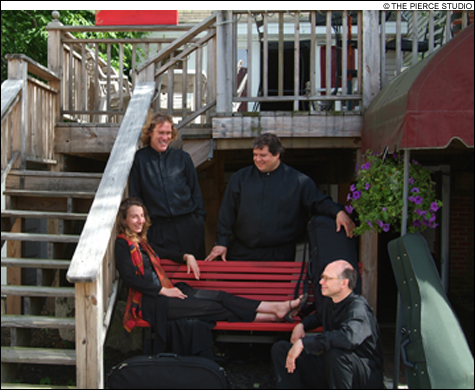
GOT A DELOREAN? DaPonte String Quartet. |
| Daponte String Quartet | 7:30 pm March 28 | State Street Church, 159 State St, Portland | $22; 21 and under free | 207.529.4555 |
Powdered wigs may be fashion-forward on Saturday, March 29, as Portland's State Street Church becomes a time machine, transporting the audience back to the early 1700s, when the musical hits debuted during the Sunday morning service. J.S. Bach was king of the German music world and Henry Purcell was proving English music was worth its weight in copper music-printing plates. And so, with a fair amount of bravado, the DaPonte String Quartet will take on two Baroque masterworks, promising an evening of enlightenment.In addition to the challenge of performing 300-year-old music, the DSQ will also perform the concert at the historically accurate pitch.
“It’s less like a flat A and more like sharp G-sharp,” says DaPonte violinist Ferdinand Liva of the Baroque-era tuning pitch A 415, a designation in which the number refers to the frequency of the sound waves of that particular pitch. Modern music is tuned to A 440.
“Playing that low is kind of driving me crazy,” says Liva, who has perfect pitch. “I’m constantly having to stop myself from fixing it.”
The members of the DSQ have also decided to perform with Baroque-style bows, which curve outward (away from the hair), instead of inward like modern bows. This dramatically changes the amount of pressure the musician can put on the strings, affecting articulation and tone. Tuning the strings lower also makes them looser, adding to the challenge of phrasing and musicality.
The DaPonte String Quartet has never done a program like this before. Although performances of J.S. Bach’s Art of Fugue are not unusual, the work is more often performed by pianists or organists than by a string quartet. Bach did not include instrumentation in his compositional notes and he died before it was published, so it is unclear whether he meant for the piece to be an exercise in intellectual composition or for actual performance.
The fugue, in which a melody called a subject is imitated in all the voices, like a round that never stops reinventing itself, fell out of favor by the end of Bach’s life. Fugues were not rediscovered until the mid-1800s when Romantic composers Felix Mendelssohn and Robert Schumann reintroduced Bach to the world as the musical genius that he was.
To write a work that fits on top of itself three or four times at staggered entrances, in octaves or twelfths, in augmentation (stretching out the note values) or inverted motion (flipping the music upside down and having it still make sense) takes a musical mastermind. Bach does this by starting with a simple melody that builds on top of itself into a complex structure of rhythms and harmonies. The music relies on the listener’s ability to recognize the subject when it returns, often just in time, rescuing the piece from an evolution into overwhelming complexity.
Less is known about the second work on the program, Henry Purcell’s Nine Fantazias in Four Parts. Like the Art of Fugue, the work does not list instrumentation. Due to the piece's range, the DSQ will perform some sections with a violin, two violas, and a cello, and others with the more typical two violins, viola, cello arrangement.